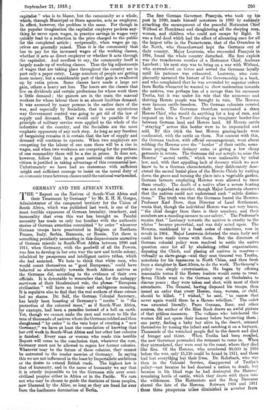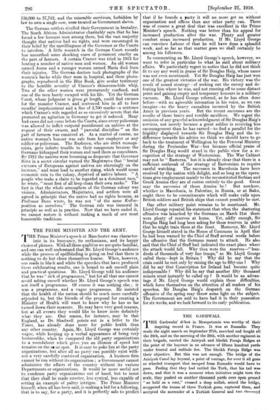GERMANY AND THE AFRICAN NATIVE.
rilllE "Report on the Natives of South-West Africa and- their Treatment by Germany " by Mr. E. H. M. Gorges, Administrator of the conquered territory for the Union of South Africa, which was published last week, is one of the most terrible exposures of German, brutality, treachery, and immorality that even this war has brought us. Painful necessity has made us only too familiar with the authentic stories of German atrocities committed "by order" wherever- German troops have penetrated in, Belgium or Northern France, Italy, Serbia, Rumania, or Russia. Yet there is something peculiarly nauseating_in this dispassionate narrative. of German misrule in South-West Africa between 1890 and 1914, when Germany, with the goodwill of all the Powers, was free to develop in her own way the new and fertile colony, inhabited by prosperous and intelligent native tribes, which she had annexed. We hate to think that white men, who would count themselves as. "good Europeans," could have behaved so abominably towards South African natives as the Germans did, according to the evidence of their own offiCials. It is detestable to remember that, for the unhappy survivors of their bloodstained rule, the phrase ." European civilization" will have an ironic and ambiguous meaning.. It is repulsive also to find that the real authors of these crimes feel no shame. Dr. Self, the German: Colonial Secretary, has lately been boasting of Germany's " merits " in "the protection of the coloured races," as if South-West Africa, for example, had-been a paradise instead of a hell on earth. Yet, though we eannot.undo the past and restore to life the tens of thousands of natives whom the Germans robbed and then slaughtered-",by order" in the vain hope of creating a "new Germany," we have- at least the, consolation of knowing that her evil work in SouthzWeetzAfriea and her ether lost colonies is finished. Every man or woman who reads- this terrible Report will come to the conclusion that, whatever the cost, Germany must not be allowed to regain her former colonies. Whatever may be the future of these colonies, they cannot be entrusted to the tender mercies of Germany. In saying this we are not influenced in the least by Imperialistic ambitions or the desire to extend British trade. The highest law is that of humanity, and in the name of humanity we say that it is utterly impossible to let the Germans. rule over, semi- civilized peoples tither in Africa or in the Pacific. We care not who may ,be chosen to guide the destinies of these peoples, now liberated by the Allies, so long as they are freed for ever from the. loathsome domination of Berlin. The first German Governor, Frangois, who took up his post in 1890, made himself notorious in 1893 by suddenly - attacking. the encampment of the peaceful Hottentot Chief Witbooi at Hornkranz and slaughtering all the sleeping men, women, and children who- could not escape by flight. It was a foul deed which had the effect of alienating. once for all the largest tribe in the Protectorate, that of the Ovambo.s in the North, who thenceforward kept the Germans out of their country. Major Leutwein, who succeeded Frangois in 1894, found the whole country disturbed. His first exploit was the treacherous murder of a Hottentot Chief, Andreas! Lambert ; his next step was to bring on a war with Witbooi, who surrendered on terms and served the Germans loyally until his patience was exhausted. Leutwein, who. com- placently narrated the history of his Governorship in a book, and who complained that he was overruled by superior orders from Berlin whenever he wanted to show moderation towards the natives, was perhaps less of a savage than his successor Trotha, but it was under his rule that the numerous and thriving Herero people was 'brought to ruin. The Hereros were famous cattle-breeders. The German colonists coveted their herds. The Governor therefore nominated a sham Herero Chief, who would do anything for a keg of rum, and imposed on him a Treaty drawing an imaginary border-line between German land and Herero land. All Herero cattle "straying" across this border were to be impounded and sold. By this trick the best Herero grazing-lands were confiscated, with the cattle on them. Not content with this, the German traders, with official encouragement, went about robbing the Hereros over the " border " of their cattle, some times paying them derisory sums or giving a few cheap garments in return. The Germans did not scruple to seize the Hereros' "sacred cattle," which were inalienable by tribal law, and, with that appalling lack of decency which we now know to be a German characteristic, they delibarately dese- crated the sacred burial-place of the Herero Chiefs by cutting down the grove and turning the place into a vegetable garden. German farmers employing Hereros were allowed to treat them cruelly. The death of a native after a severe b3ating was not regarded as murder, though Major Leutwein observes that the natives could not understand such "subtle distinc- tions," The truth was that the Germans feared the Hereros. Professor Karl Dove, then Director of Land Settlement, wrote that though the individual Herero was not very brave, "the chief danger from them is their numbers, and their numbers are a standing menace to our safety." The Professor's maxim that "Leniency towards the natives is cruelty to the whites" became proverbial, and was duly acted upon. The Hereros, maddened by a fresh series of exactions, rose in revolt in 1904. Major Leutwein- defeated the main body and could have made terms with them. But the directors of German colonial policy were resolved to settle the native question once for all by abolishing tribal organizations, deposing the Chiefs, and placing all natives in reserves-- virtually as slave-gangs—and they sent General von Trotha, notorious for his, massacres in North' China, and, then fresh from a slaughter in EastAfrica, to do the work. The General's policy was simply extermination. He began by offering reasonable terms if the Herero leaders would come to treat. Seven Chiefs went to the German camp at Ombakaha to discuss peace • they were taken and shot, with most of their attendants. The General, having disposed his troops, then issued an order that every- Herero, man,' woman, or child, should be killed; "I wished," he said, "to ensure that never again would there be a .H,erero rebellion." The ordet was executed literally. From German, Boer, and other sources, the author of the. Blue Book -draws an awful picture of that pitiless massacre. The ruffians who butchered the women did not spare. their honour before bayoneting them; one party, finding a baby boy alive in, the. desert, amused themselves by tossing the infant and catching it on a. bayonet. Thousands of the wretched people fled to the desert and died of hunger and thirst. When Trotha had been. recalled, the new Governor persuaded the remnant to come in. When they surrendered, they were sent to the coast, where they died like flies. Of the Hereros, who numbered 80,000 in 1901 before the war, only 15,130 could be found in 1911, and. these had lost everything but their lives. Dr. Rohrbach, who was then in the Colonial Service, disapproved of Trotha's policy—not because he had doomed a nation to death, but because in his blind rage he had destroyed the Herero3 remaining herds of cattle, which they drove with tkem into the wilderness. The Hottentots and the Berg Damara, shared the, fate of the Hereros. Between 1901 and 1911 these three prosperous tribes diminished in number from 130,000 to 37,742, and the miserable survivors, forbidden by law to own a single cow, were treated as Government slaves.
The German settlers rivalled their Government in brutality. The South African Administrator charitably says that he has found a few humane men among them, but the vast majority thought that natives had no rights, and were encouraged in their belief by the unwillingness of the Governor or the Courts to interfere. A little research in the German Court records has unearthed some shocking cases of persistent cruelty on the part of farmers. A certain Cramer was tried in 1913 for beating a number of native men and women. An old woman named Auma and a younger woman named Maria died from their injuries. The German doctors took photographs of the women's backs while they were in hospital, and these photo- graphs, reproduced in the Blue Book, give ocular testimony to the horrible severity of Cramer's rhinoceros-bide whip. Two of the other women were prematurely confined, and one of the men barely escaped with his life. Yet the German Court, whose judgment is given gd length' could find excuses for the monster Cramer, and sentenced him in all to four months' imprisonment and a fine of 2,700 marks—a sentence which Cramer's wife regarded as so excessively severe that she promoted an agitation in Germany to get it reduced. Many bad cases did not come before the Courts, since every policeman u as allowed to inflict corporal punishment on natives at the request. of their owners; and "parental discipline" on the part of farmers was connived at. As a matter of course, no native woman's honour was safe from her employer or any soldier or policeman. The Bushmen, who are strict monoga- mists, gave infinite trouble to their conquerors because the Germans kidnapped their women and used them as concubines. By 1912 the natives were becoming so desperate that Governor Seitz in a secret circular warned the Magistrates that "brutal excesses of Europeans against natives are alarmingly on the increase," and must lead to another rising, which would mean economic ruin to the colony, deprived of native labour. " A people who make a claim to be regarded as a dominant race," he wrote, "must first of all keep clean their own ranks." The fact is that the whole atmosphere of the German colony was vicious. Administrators, Magistrates, and settlers were all agreed in principle that the native had no rights because, as Professor Dove wrote, he was not "of the same Kuitin- position as ourselves." The German rule was immoral in principle as well as in practice. Now that we have ended it, we cannot restore it without making a mock of our most honourable traditions.



































 Previous page
Previous page